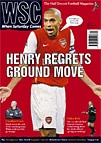 The problem of Paris Saint-Germain’s notoriously far-right supporters exploded when a policeman opened fire after a racist mob confronted fans of Hapoel Tel-Aviv. Nicolas Hourcade reports
The problem of Paris Saint-Germain’s notoriously far-right supporters exploded when a policeman opened fire after a racist mob confronted fans of Hapoel Tel-Aviv. Nicolas Hourcade reports
Thursday November 23, 11pm, the Porte de Saint‑Cloud area of Paris, near the Parc des Princes. Paris Saint-Germain have just been humiliated 4-2 in the UEFA Cup by an average Hapoel Tel-Aviv team. The hardest PSG fans are running at opposing supporters. According to the initial results of the investigation, one of the Hapoel fans was being chased by a group of Parisians when a 32-year-old black man, only identified as a plain-clothes policeman, intervened. He tried to break up the group with tear gas. But in the face of their aggression he retreated, fell down, took out his gun and fired, killing one of his assailants and seriously injuring another. He sought refuge in a McDonald’s, which was then attacked by PSG fans screaming racist abuse until the police broke up the crowd.